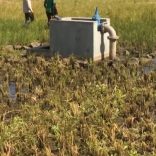Mozambique: Mopeia to have irrigation systems powered by national electric grid and solar energy
Mozambique will achieve Zero Hunger by 2030

File photo: APA
Mozambique is well advanced along the path to achieve “Zero Hunger” by 2030, according to Agriculture Minister Higino de Marrule.
Achieving an end to hunger by 2030 is one of the Sustainable Development Goals adopted by world leaders at a United Nations summit in September 2015.
Interviewed by AIM during the economic conference in Maputo organised by the British newspaper the “Financial Times”, Marrule noted that when President Filipe Nyusi launched the 2018-2019 agricultural campaign “the challenge he threw down was that of continuing our effort to put Mozambique on the route to Zero Hunger. And thanks to the initiatives undertaken by the agricultural sector, we can state that we are on the right path to attain this goal by 2030.”
The government’s policies are contained in the Agricultural Sector Development Programme (PDSA), which includes such key questions as access to markets for producers (which has long been a major headache for Mozambican farmers), and the entire value chain for agribusiness, ranging from the supply of inputs through to processing and to distribution to consumers inside and outside the country.
“The challenge right now is to guarantee that most of the processing of agricultural products for export is done primarily in Mozambique”, said Marrule, which would mean creating and retaining jobs in processing industries.
He added that his Ministry is in permanent contact with other government bodies to ensure coordination of the activities intended to boost the Mozambican agrarian economy, through a series of incentives, which should encourage farmers to produce not only for their own needs, but also for export.
“Cross-cutting measures are being developed”, said Marrule, “such as the agricultural marketing plan, which will help move surplus produce, industrial and commercial initiatives to promote agro-processing, road improvements to ensure access to remote productive areas, as well as the development of irrigation”.
Key crops and value chains are being developed for each province, depending on the specific agro-climatic conditions. “We have 17 strategic products in the agricultural sector, of which seven are priorities”, said Marrule. “But I don’t mean that other value chains that are promising and have a guaranteed market cannot also be stimulated”.
“The level of food insecurity and the number of people going hungry has declined over the past ten years”, said the Minister. A decade ago 56 per cent of the population had been classified as food insecure, “but today it’s 24 per cent, so there’s been an improvement”.
The percentage of malnourished children under the age of five has also fallen. “It was 48 per cent ten years ago, and now it’s 41 per cent”, said Marrule, “but there still remain many challenges in the sector”.
Government policies, he stressed, are oriented towards the rural areas, particularly to improve the condition of rural women producers.












Leave a Reply
Be the First to Comment!
You must be logged in to post a comment.
You must be logged in to post a comment.